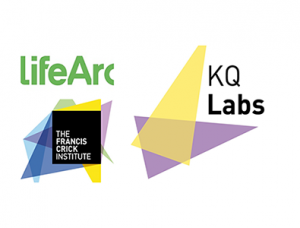KQ Labs, an accelerator programme focused on data-driven health, run by the Francis Crick Institute and now funded by LifeArc, has selected 10 new start-ups for its third cohort.

Following a highly successful second cohort, KQ Labs, an accelerator programme for start-up companies with high growth potential in the area of data-driven health, is welcoming 10 exciting new start-ups. A large number of high-quality applications for the programme were received, from which 20 start-ups were selected for interview, with the top 10 invited to join the third annual programme of KQ Labs.
The KQ Labs programme provides customised support and resources for start-ups working on propositions that will have a major positive impact on health. This year’s cohort includes companies using data to tackle diverse problems in domains including Parkinson’s Disease, cancer and drug discovery, amongst others.
The 10 selected start-ups will take part in a programme running over five months, consisting of weekly workshops with experts from a wide range of areas relevant to digital health, and training in transferable skills, as well as mentoring and discussions with investors and potential corporate partners. In light of the COVID-19 pandemic, the programme will be delivered virtually.
To mark the end of the programme, a Demo Day in March will provide an opportunity for the start-ups to pitch their propositions to potential investors and partners. The 20 start-ups from the previous two KQ Labs cohorts have continued to make excellent progress in fundraising, grant awards and collaborations.
The KQ Labs accelerator represents a unique opportunity to use the Crick’s convening power to contribute to building a world-class cluster of deep technology data-driven health start-ups in the UK, reinforcing its position as a major force in artificial intelligence in health and life sciences. KQ Labs is now funded by LifeArc, a self-funded medical research charity. This strategic partnership represents an exciting way for LifeArc to help the most promising data-driven health companies realise their full potential.
Veronique Birault, Director of Translation at the Crick commented:
“Supporting researchers and entrepreneurs is vital to ensuring the strength of digital healthcare and medicine in the future…With many experienced, world-leading experts in our network offering guidance and training as part of KQ Labs, we hope to help these start-ups to achieve their goals and develop into exciting companies that can deliver better treatments or improved quality of life for patients across the globe.”
Clare Terlouw, Head of LifeArc Ventures said:
“LifeArc is delighted to be funding this programme at the KQ Labs and helping to advance new technologies in data driven health. LifeArc plays a vital role in advancing medical research by providing the funds, advice and scientific expertise to translate early stage innovation, and we are very pleased to be part of helping these new companies thrive.”
The start-ups taking part in KQ Labs this year are:
- AI VIVO uniquely combines systems biology and machine learning/AI to build a disruptive platform technology to accelerate drug discovery. The platform fundamentally changes how we represent diseases and the effect of treatments phenotypically and enables us to predict multiple unexpected disease modulation strategies & experimentally validate them significantly faster, cheaper & more accurately.
- Benetalk has developed a digital speech therapist that monitors speaking patterns and provides immediate feedback to help people who stutter to master fluency speaking habits during daily activities.
- Brightlobe develops cutting-edge technology that can intelligently assess and support a child’s developmental trajectory through mobile games and smart toys.
- Charco Neurotech has developed a non-invasive wearable device for Parkinson’s which uses pulsed cueing and focused vibrotactile stimulation to reduce symptoms of slowness and stiffness, resulting in improved movement and helping people with Parkinson’s manage their day-to-day life.
- GLAMOROUS AI has a novel approach to chemical design and optimisation. Its proprietary platform, Rosalind, augments advanced machine learning with human expertise to enable applications where only limited data points are available.
- Itecho Health provides digital health applications and services for the monitoring and management of long-term conditions.
- Mpixl combines deep learning and MRI radiology for faster and kinder care of leukaemia patients.
- Little Journey use technology, research and data to transform healthcare & research outcomes through an end to end psychological preparation and support tool for children and their families.
- Oxford Cancer Analytics aims to revolutionise early cancer detection and treatment through affordable blood tests using automated machine learning platforms for data analysis, biomarker discovery and patient stratification.
- Syrona is a personalised digital women’s health screening and digital therapeutics platform, with a first focus is endometriosis.
– ENDS –
For further information, please contact:
Emma Fox
Project Coordinator for KQ Labs
The Francis Crick Institute
Email: emma.fox@crick.ac.uk


